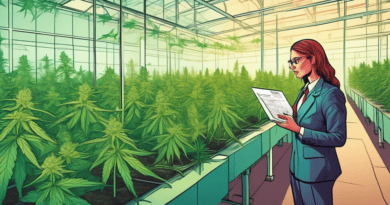Protecting Intellectual Property in Cannabis Biotechnology
Protecting that investment of time and money, by acquiring Intellectual Property protection that prevents others from profiting from using your name, your creative materials, or your unique strains is how many investors expect to see a return on their investment.
As cannabis continues to grow in popularity and legalization expands, the competition in the market continues to grow as well. One way to carve out an advantage for any business is savvy intellectual property (“IP”) protection.
Intellectual Property generally means protecting copyrightable subject matter, trademarks and patents.
Each of these have slightly different impacts in the cannabis biotechnology industry. In addition to the difference in types of IP protection, there are different nuances to protection based on if the technology or produce is directly cannabis, for instance a new strain of cannabis, or if it is cannabis related or adjacent, for instance hydroponic units.
The easiest type of IP to address is copyright, but it has limited application in this space.
The copyright office will register any new and original work of authorship, but copyrights are typically artistic in nature.
The cannabis industry would be wise to use copyrights where it can because they are the cheapest type of IP protection to obtain and the damages available if they are infringed can make it worth it.
As generally artistic in nature, copyrights do not have a broad application to biotechnology. However, they can and should be used to protect marketing materials for any new products, instruction manuals, websites or packaging.
Trademarks generally protect brand names and are more complicated for the cannabis biotechnology space.
Trademark protection is only available for products that can be legally sold under federal law. Because the sale of marijuana is prohibited under the Controlled Substances Act (“CSA”), trademark protection is not straightforward for companies in the cannabis industry.
This prohibition can also extend to products “primarily intended or designed for use in manufacturing, compounding, converting, concealing, producing, processing, preparing, injecting, ingesting, inhaling, or otherwise introducing into the human body a controlled substance, possession of which is unlawful.”
While some cannabis companies have successfully obtained trademark protection for non-cannabis products, the USPTO’s current policy is to refuse all trademark applications for cannabis-based goods and services as illegal.
“There is a race to trademark brands under the ‘smoking accessories’ classification, and other tangential classifications. So that category, in particular, is getting hammered pretty hard as a holding place for brands that would otherwise seek trademarks in a cannabis classification.
We are waiting for the cannabis classification to open up when it becomes federally legal, and we expect to apply again at that time,” said Adam Simon, owner of The Reef, a marijuana retailer with multiple locations in Washington state.
Businesses can still register lawful goods and services, including hemp products and cannabidiol (“CBD”) products, as well as non-cannabis products like clothing. However, if the U.S. Patent and Trademark Office (USPTO) discovers that the mark is also used for products that violate the CSA, the mark could be invalidated.
Companies, especially those marketing CBD products, should also be aware of any FDA regulations, since violation of the Food Drug and Cosmetic Act (“FDCA”) is also grounds for invalidity, much like violation of the CSA. For these reasons, if and until federal legalization, businesses should avoid cross-pollination of their valuable trademarks with anything potentially illegal under the CSA, or FDCA.
In the meantime, there are different ways to deal with that ban around how a product is defined. If a business has a biotechnology product that can have multiple uses, for instance hydroponic growing of any plant or distilling of any organic oil, then that business can likely protect its name by focusing the trademark application on the federally legal side of the business with a different mark even if the product is virtually identical.
The same strategy would hold true if another business were making drinks or other infusions of various types.
If a product is more directly the plant itself, last year’s change on hemp can have the same impact. If the business grows multiple strains, including hemp, focus protection on the legal side. It is possible choose names that may be attractive across different applications, so that if another business uses a trademark acquired on legal goods on purely cannabis or illegal goods, you could still sue for infringement based on the similarity in product lines and the confusion to the consuming public.
If none of these workarounds are available, state trademark protection may still be available, depending on the state.
If a state legalized cannabis in some form, it is likely that a business owner can get a state trademark for their business or product. State registrations are often less expensive, but with limited remedies available. For instance, a state mark in Washington only prevents use of that mark in the state of Washington, not in any other state. Therefore, businesses operating in multiple states would need multiple registrations. Additionally, any enforcement may be forced to be in a state court system rather than federal courts, which, depending on the state, may have its own set of complications.
The last type of IP protection to discuss is patent protection.
There are three types of patents that all have potential impact on cannabis biotechnology: utility patents, design patents and plant patents.
Utility patents protect new methods or devices, design patents protect artistic features on a non-artistic product, and plant patents protect new asexually reproduced species of plants designed by companies.
Plant patents have the most obvious impact on the cannabis industry, as they can prevent anyone else from growing a new strain developed by a company, but only asexually developed plants that and only a specific genome.
Utility patents are broadly used in other industries to protect new functional inventions or methods of manufacturing, but they can also apply to new sexually reproduced plants or genetically engineered plants.
In the cannabis space, a utility patent could protect a new method of processing or a new machine designed to process cannabis in some way. It could also protect new strains of plants developed by protecting their genome, specific traits.
Utility patents over plants, and their seeds, are broadly used in agricultural business to prevent farmers from access to certain genetically enhanced seeds without paying large licenses or buying from a particular source, or even in some instances suing farmers whose fields contained plants that they allegedly didn’t grow, but that were deposited there from natural sources such as wind.
Design patents are less obvious, but useful tools for any commercial products.
To prevent your product from being directly copied, include artistic and not functional aspects in the product design. Those features can be patented as design patents and, if they are copied by others, they can be sued for infringing those features.
Finally, many businesses are interested in licensing their IP to cannabis companies, whether for brand names, recipes, production methods, patented technologies or otherwise.
In doing so, both the licensor (the company granting someone else the right to use its IP) and the licensee (the company receiving the right to use someone else’s IP) need to be very mindful about the relevant state cannabis laws.
By way of example, in Washington State, any person or entity receiving a percentage of revenue or otherwise exercising control over a cannabis-licensed business in exchange for money or expertise must be disclosed to and vetted and approved by the Washington State Liquor and Cannabis Board. So, a traditional royalty arrangement – in which the licensor receives a percentage of sales and provides the licensee stringent specifications for compliant products – may not be feasible, depending upon the jurisdiction.
Currently companies in the cannabis space are expanding all areas of IP protection, but especially patents. This trend is expected to continue in the future as the industry expands and as more money is invested in the industry.
“While trademarks and other forms of intellectual property are currently difficult to enforce in the cannabis space, our goal is to build a strong, durable business which can align with the expected growth of cannabis over the next decade. As more institutional capital moves into the industry, we believe investors will place a premium on companies that have pursued models which support long term value creation,” said Ed Harris, Co-Founder of Pacific Growth Capital, an independent M&A and financial advisory firm serving the legal cannabis industry.
Even if a business decides not to pursue IP protection, it cannot operate in a vacuum assuming others will have similar good will. Instead, before making a new product, growing a new strain, or putting out any new marketing materials, businesses should review those to make sure no one else has IP protection over the new product. If so, the business will need to alter its product to avoid the limits of such protection and ensure that the company does what it can to avoid costly and time-consuming lawsuits.
Benjamin J. Hodges, principal at Foster Garvey in Seattle, Wash., is a registered patent attorney focused on complex litigation and technology counseling. His technology practice includes litigation and also counseling small and large companies on all types of issues impacting their companies, including guiding IP prosecution efforts. He has counseled individuals and companies in service industries, manufacturing, telecommunications, software, food and consumables, petroleum refining, internet and media, and transportation.




